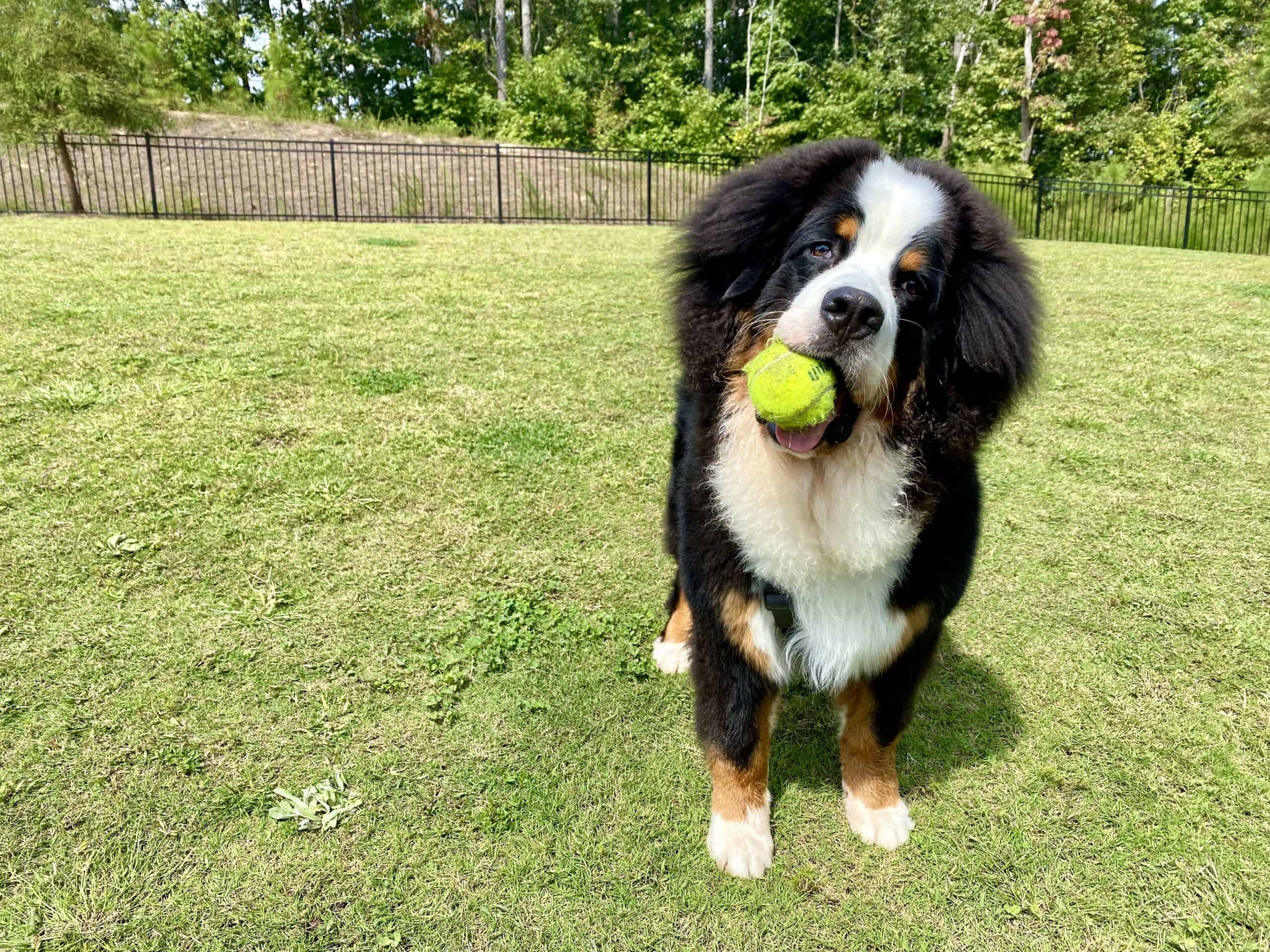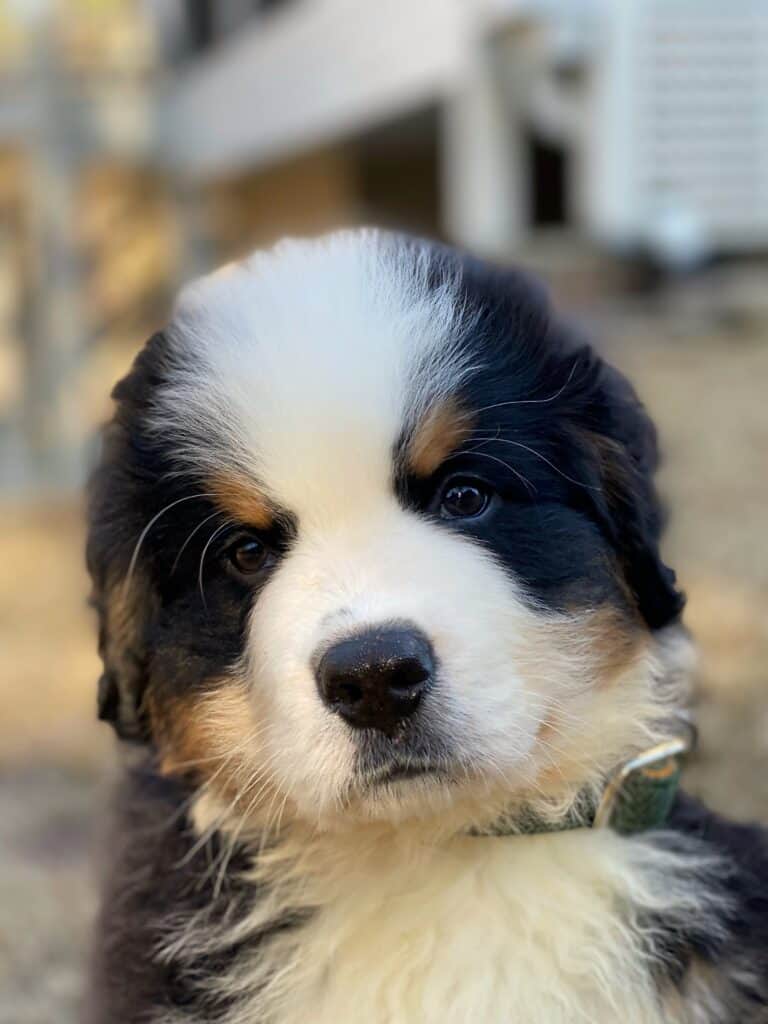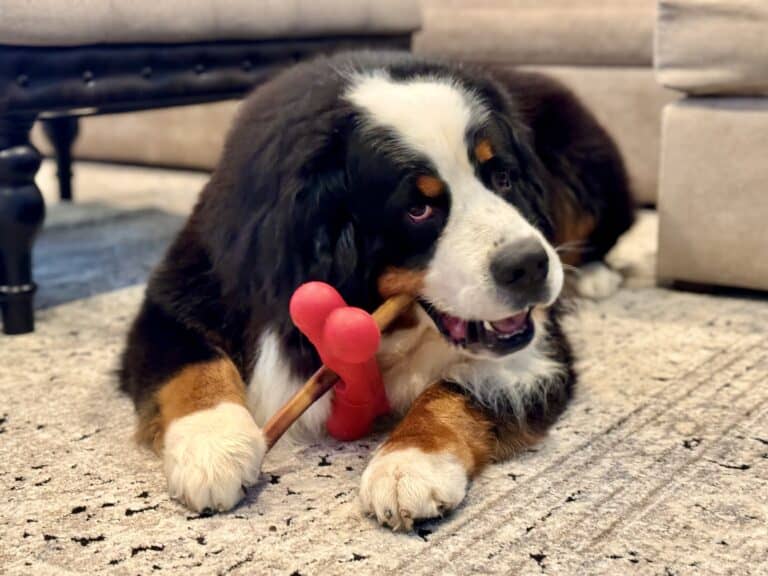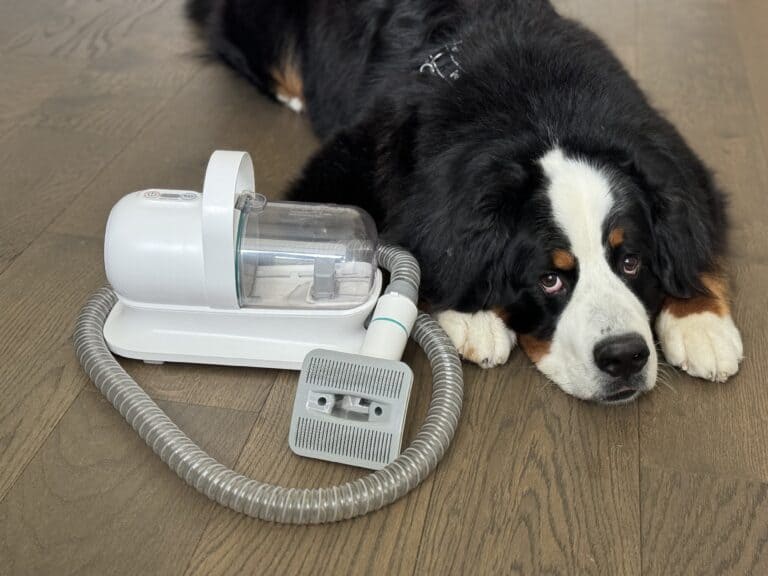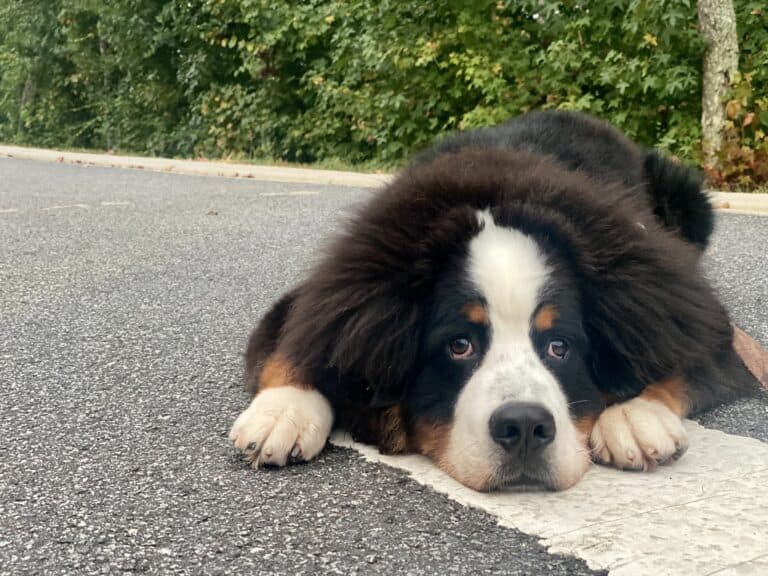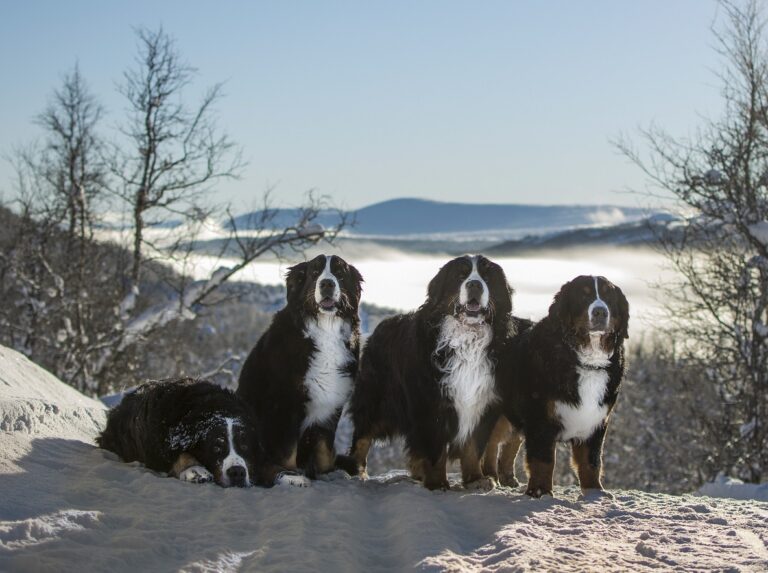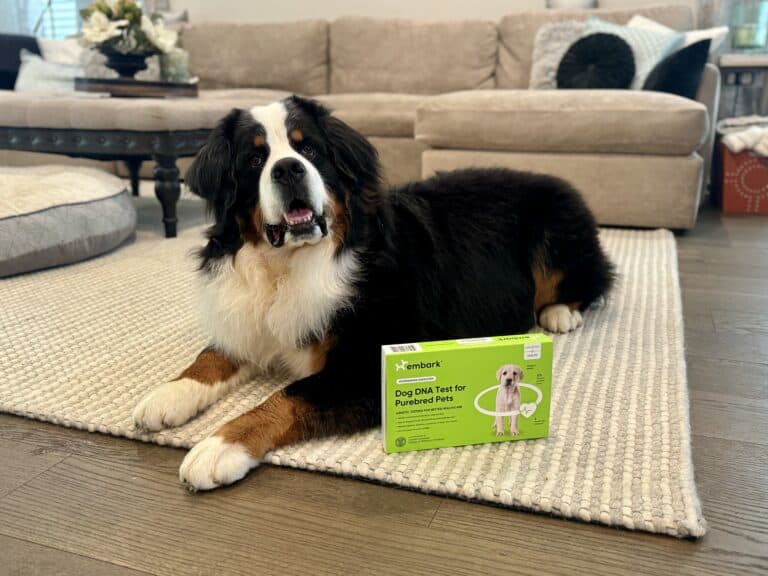8 Reasons a Bernese Mountain Dog May Not Be Right for You
Bernese Mountain Dogs have grown in popularity over the past decade, rising from #32 on the American Kennel Club’s 2013 list of the most popular dog breeds to #21 in 2023. Unfortunately, as the much beloved Berner rises in popularity, the number of them ending up in rescue also goes up.
Many dog lovers are drawn to the stunning appearance of the Bernese with their tri-color coat, distinct markings, large block heads, and sleek black fur. Add an affectionate and sweet Velcro-dog nature to their beauty, and you have the recipe for high demand.
However, Bernese are not for everyone, and it is essential to thoroughly research a breed to decide whether it is the right fit for you and your family. Here are 8 Reasons a Bernese Mountain Dog May NOT Be Right for You.
Size
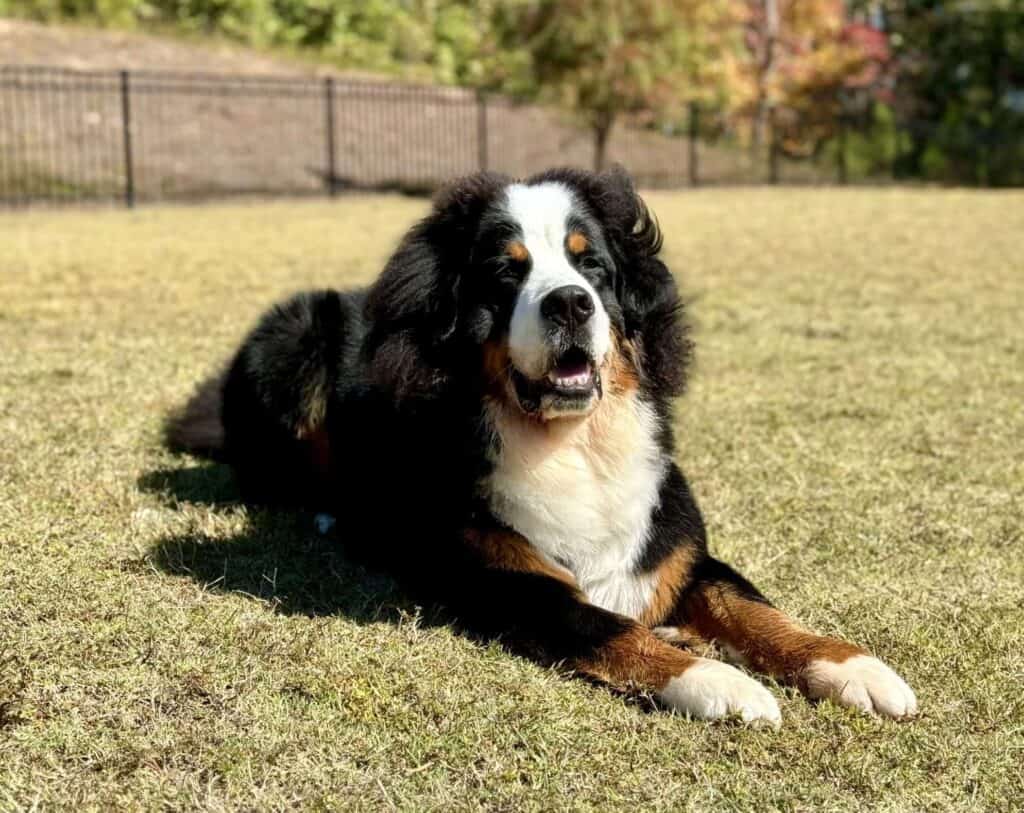
Bernese are large, strong, and powerful working dogs weighing between 70 and 120 pounds at full adult size.
Bernese were bred as all-purpose farm dogs. One of their primary duties was pulling carts of dairy products to market for farmers. Their bone structure and musculature allow them to pull up to 10 times their body weight.
A large, exuberant Berner who has not learned how to walk politely on a leash is not a good match for everyone. These dogs can easily overpower a child or an older person.
Their size can also present logistical issues for getting them in and out of vehicles, carrying them in case of an emergency, and having a dog that large inside your home. There is a reason one of Riggie’s nicknames is the Bernese bulldozer!
Berners are also notoriously affectionate and sweet dogs who do not always understand the concept of personal space. Life with a Berner will include a 100+ pound lap dog watching TV on top of you and waking up to a full body-length Bernese weighted blanket.
Are you and your family physically capable of handling a hyper 120-pound dog? Are you prepared to welcome a dog of that size into your home? If you want a smaller lap dog, a Bernese may not be right for you.
Development
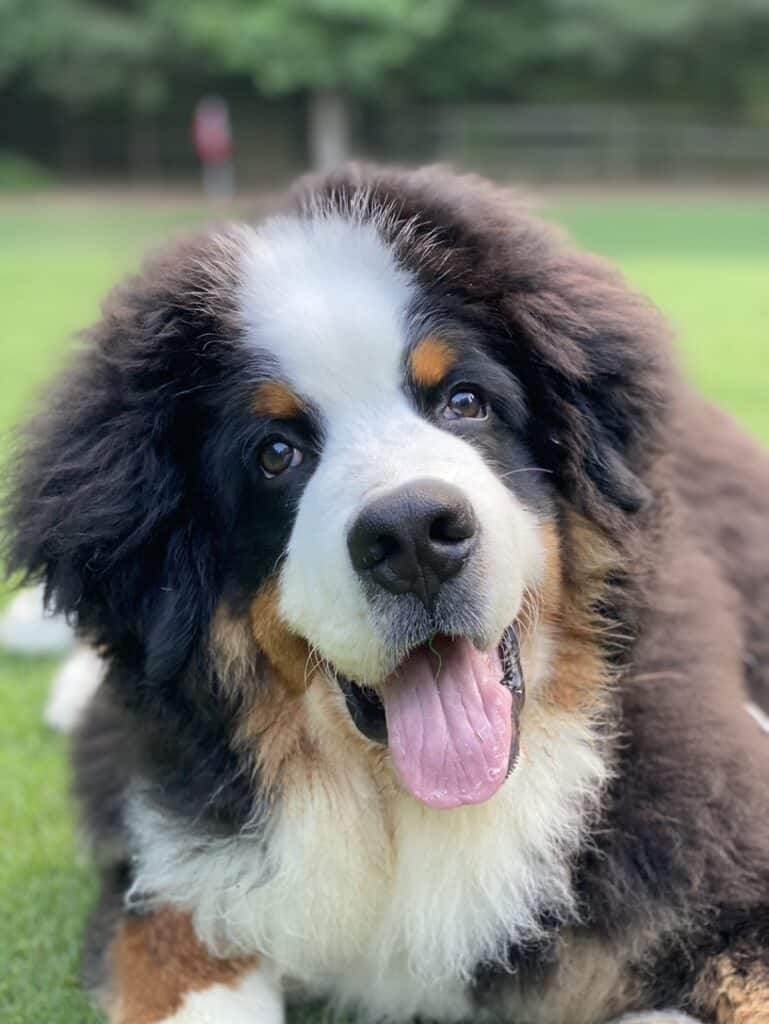
Bernese are slow to mature both physically and mentally.
A Bernese puppy’s size and maturity are not always in alignment. As puppies, they physically grow rapidly but do not reach their full adult size until they are 2.
Do not let their quick-growing bodies fool you into thinking they also mentally mature quickly. They can retain puppy enthusiasm, energy, and behaviors like chewing, mouthing, and roughhousing until they are 3 or older.
Are you prepared to manage puppy behaviors in a 120-pound dog for up to 3 years? Will you have the time, energy, and finances to train your Berner throughout their developmental years?
If you are not prepared to handle puppy antics for this length of time and commit to regular training, a Bernese puppy may not be right for you. An older rehomed or rescued Bernese may be a better choice if you wish to avoid the puppy years. Find out more at Bernese Mountain Dog Rescue: Everything You Need to Know.
Coat
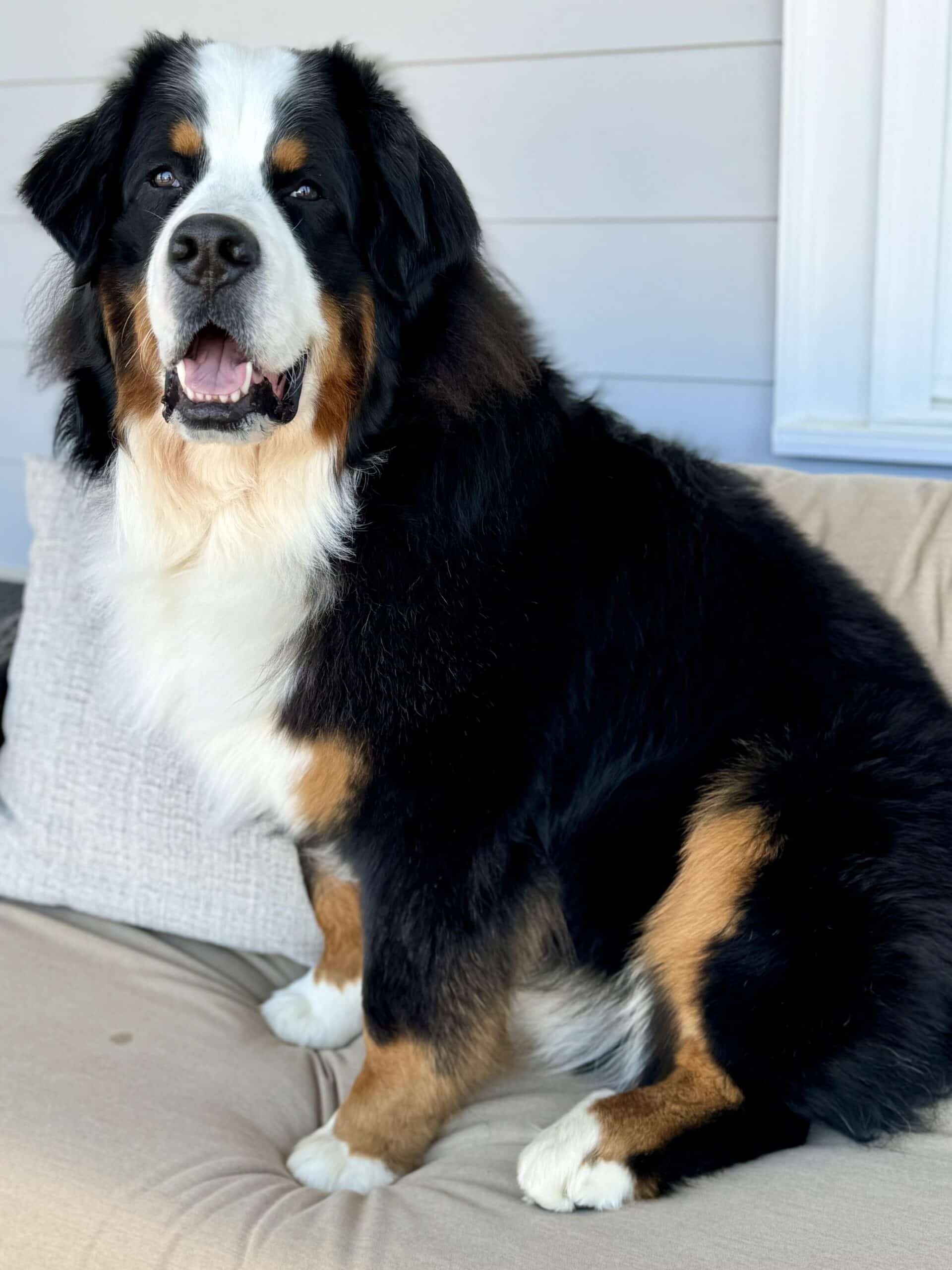
Bernese are double-coated, NOT hypoallergenic, and shed profusely.
If your family members are allergic to dogs, do not get a Berner. Dog hair and vacuuming will become part of your daily existence. You will find dog hair in areas you never dreamed possible (like in your refrigerator).
They shed their coats once or twice a year for 3 – 6 weeks, and your home will be inundated with dog hair during this time. Daily brushing and regular grooming can help tremendously. However, the hair will always be there!
Do you despise dog hair on your clothes, floors, and furniture? Do you hate vacuuming? Does the idea of brushing your dog every day turn you off? Is someone in your family allergic to dogs? If so, a Bernese may not be the right dog for you.
Heat Intolerance
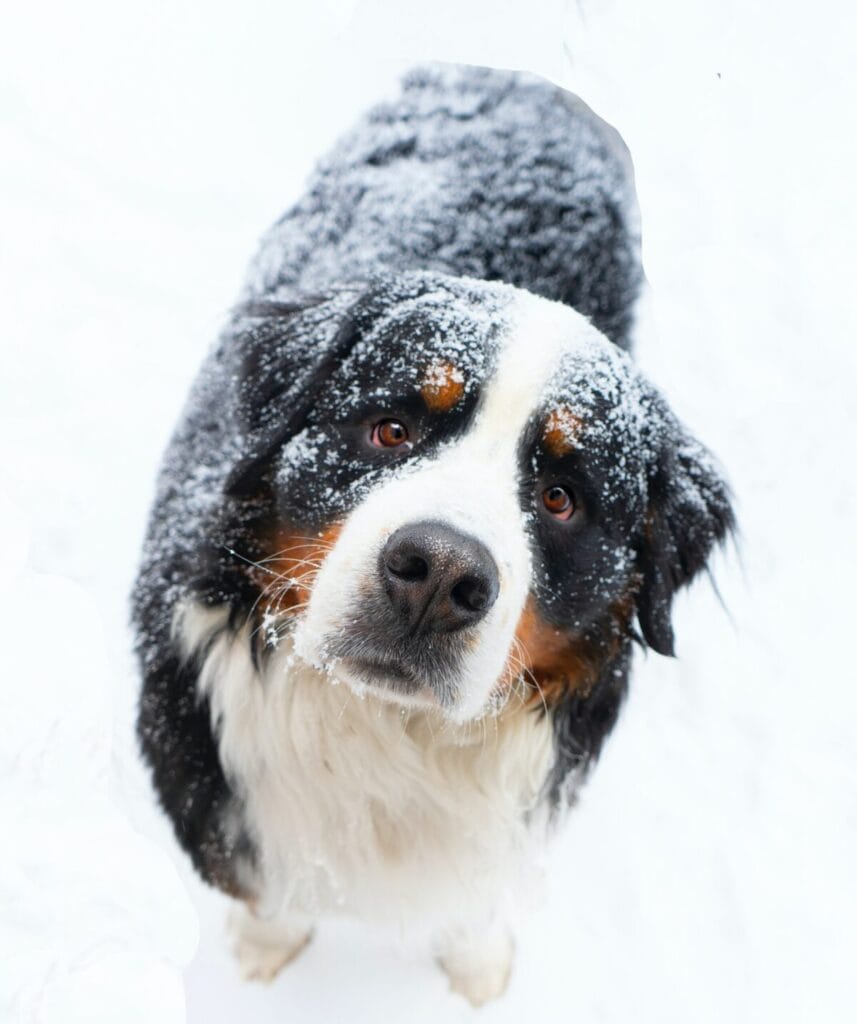
Bernese are not suited to warm or hot climates.
Bernese were bred in alpine Switzerland to work in snowy, mountainous conditions. Their thick double coat provides insulation from the cold and protection from the winter elements, and their black fur absorbs the sun to provide additional warmth.
These characteristics make them an extremely heat-interolant breed that does not do well in weather above 70 degrees. They are highly susceptible to heatstroke in warm weather and serious precautions need to be taken to keep them cool and hydrated.
Do you live in a climate that is above 70 degrees the majority of the year? Are you ok with only participating in outdoor activities with your dog early in the morning and late in the evening during the summer? If you plan to regularly be outdoors with your dog in warm or hot weather, a Bernese Mountain dog may not be right for you.
Lifespan
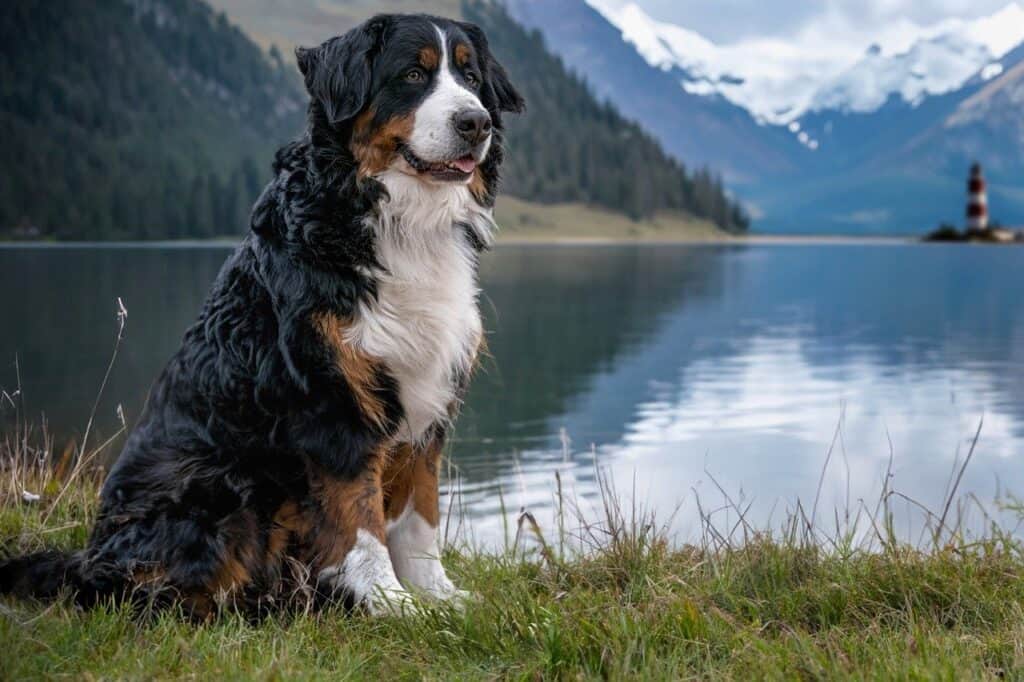
Bernese have tragically short lifespans of only about 7-9 years due to many common health conditions, genetic diseases, and high rates of cancer in the breed.
The Berner-Garde Foundation is a charitable organization “dedicated to advancing the health of Bernese Mountain Dogs by fostering collaboration and providing resources to reduce genetic diseases.” They maintain a database of over 200,000 dogs and assist in efforts to improve the breed’s health and longevity.
According to the Berner-Garde Foundation, the current average lifespan for Bernese Mountain Dogs is 8 years old. The unfortunate reality of owning a Berner is knowing they will likely not live to see a 10th birthday.
Are you prepared to lose your beloved fur baby at just 7-9 years old? If you want a dog that lives well into their teens, a Bernese may not be right for you.
Healthcare Costs

Bernese are prone to many health conditions, inheritable diseases, and cancer, so veterinary costs can be extremely high.
Common health issues include cancer, gastric torsion and volvulus (bloat), hip and elbow dysplasia, Von Willebrand’s Disease, autoimmune diseases, thyroid disorders, eye diseases, arthritis, allergies, degenerative myelopathy, and bowel disorders.
Pet insurance or a large savings account earmarked for veterinary expenses are highly recommended for Bernese. Some breeder contracts require you to obtain pet insurance.
There are genetic tests and health screenings for some of these common conditions. Ethical breeders will always conduct health screenings on their dogs before breeding them and will provide copies of these health certificates to potential puppy buyers. To learn more, check out How to Find Bernese Mountain Dog Breeders: A Complete Guide.
Are you financially prepared for the costs associated with caring for a Bernese with multiple chronic health conditions? If you do not have the financial means to provide for these possibilities, a Bernese may not be right for you.
Furthermore, the costs of owning a Berner go far beyond healthcare. For a complete breakdown, read How Much Do Bernese Mountain Dogs Cost?
Energy
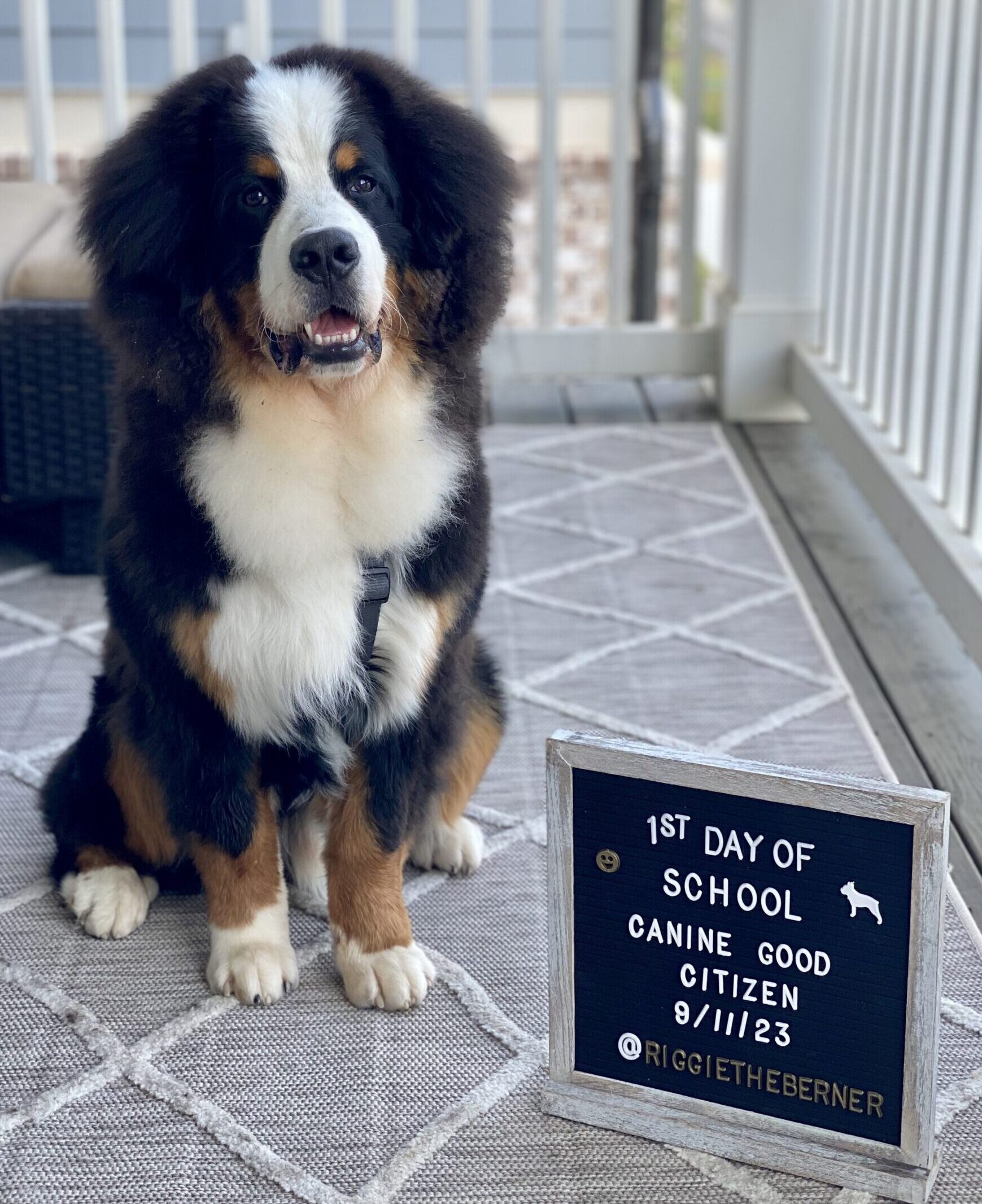
Bernese are a very active, working breed that needs regular physical and mental stimulation.
Due to their innate drive to work, working breeds are known for their insatiable desire to “do a job” and make some of the most successful human assistants. With this drive comes boundless energy, which can be challenging for a busy person to manage.
Multiple daily walks, hikes, “sniffaris”, training, dog sports, brain games, and enrichment toys are needed to fulfill their physical and mental needs. The younger the dog, the higher the requirements.
Do you have the time, energy, and inclination to devote to many daily activities with your dog? Are you prepared to spend a large portion of your day tending to its physical and mental needs? Does your daily schedule allow for this? If not, a Bernese may not be the right dog for you.
Socialization Needs
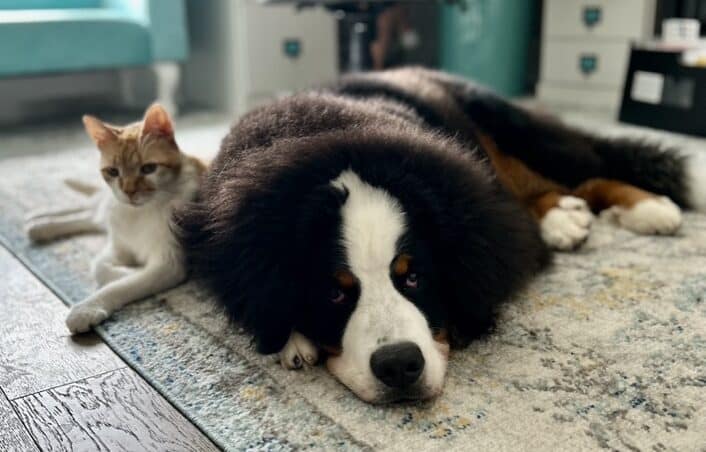
The breed standard states Berners may be “aloof to strangers”; however, some Berners can be shy or fearful.
Berners are well-known for being extremely affectionate and great family dogs. However, they must still be adequately trained and socialized to nurture their best temperament. As with any dog, lack of training and socialization can lead to behavioral issues. Berners are not immune to this despite their well-known sweet nature.
Their size and power require owners to commit to training as soon as puppies are fully vaccinated and continue as long as needed to ensure good manners and healthy socialization skills have developed. Good temperaments are not a given, and responsible pet ownership requires owners to work with their dogs to develop them.
Are you prepared to commit to taking your Berner to weekly training classes for the first year of their life (or longer, if needed)? Are you willing to work with your Berner in his daily life to reinforce what he has learned regularly? Will you take him places to socialize him with new environments, experiences, and people? If this does not sound appealing, a Bernese may not be right for you.
By now, you should have a clear picture of some of the challenges associated with raising and caring for a Bernese Mountain Dog and why they are not a fit for everyone. Matching a dog with your family, lifestyle, and finances is of the utmost importance to ensuring a long, healthy, and fulfilled life for your dog and keeping dogs out of rescues and shelters. If you are asking yourself, “Is a Bernese Mountain Dog right for me?”, an honest assessment of the above questions should guide you to a clear answer.
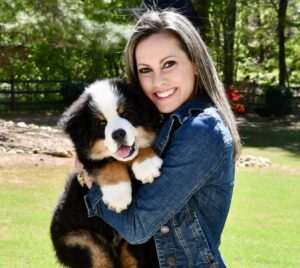
Katie Vincent is a dog lover, world traveler, and passionate creative who left a successful career in medical device sales to become a digital marketer, content creator, and writer. She has owned large-breed dogs for over 30 years, traveled to 42 countries, and taken 57 online courses. She now writes about all three at Riggie the Berner, Travel Planner Katie, and Creator Katie.


